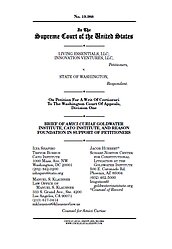Learn more about Cato’s Amicus Briefs Program.
In a time of “fake news” and “alternative facts,” corporations are being penalized for making claims about their products that they have reason to believe are true. The state of Washington filed a civil suit against Living Essentials, LLC, the company behind 5‑Hour Energy, because Living Essentials stated the belief that 5‑Hour Energy is superior to coffee. Living Essentials is currently on the hook to pay the state over $2,000,000 in civil penalties for allegedly deceptive advertising.
More specifically, Washington took issue with three statements made by Living Essentials in its advertisements for 5‑Hour Energy: 1) 5‑Hour Energy was more effective then coffee because the nutrients prolong the effects of caffeine, 2) Decaf 5‑Hour Energy can provide a feeling of alertness without caffeine crash, and 3) 73 percent of 3,000 doctors polled recommend 5‑hour Energy. Washington refused to provide any evidence to prove any of these claims are false. Instead, they argued that Living Essentials had to substantiate the claims before making them. Furthermore, while Washington acknowledges that 73 percent of the doctors polled did in fact endorse 5‑Hour Energy, the state argued the ad was nevertheless deceptive because it “overstates the medical confidence in the health benefits of the product.”
Living Essentials lost in Washington state courts and now is appealing to the Supreme Court. Cato has joined the Goldwater Institute and the Reason Foundation on a brief supporting the petition. Living Essentials argues that it violates the First Amendment for a state to require a company to substantiate factual claims before making them. If such a law were applied to political speech, it would be obviously unconstitutional. There’s no good reason to apply a different standard to commercial speech. Surely, a person wouldn’t be liable if they recommended 5‑Hour Energy to a friend because it’s better than coffee.
But the Supreme Court has said that commercial speech gets less protection under the First Amendment then other types of speech. The Court’s rationale is that companies are better suited to fact check information before speaking. However, the same reasoning could be applied to politicians and other political speakers. Deceptive claims made by politicians can be much more harmful than deceptive claims made by businesses, yet such claims are fully protected by the First Amendment.
Additionally, it’s been argued that commercial speech should get less protection to prevent companies from making fraudulent health and product claims. But fraudulent speech does not receive First Amendment protection, so that is not a convincing reason to give all commercial speech less protection. Companies can be held liable for fraudulent speech without subjugating all of their speech to lower protection.
Relegating commercial speech to a second-class status is not supported by a textualist or originalist interpretation of the constitution. Commercial speech should receive the same protections that politicians receive, and Washington should not be able to punish companies for comparing their products to others.

This work is licensed under a Creative Commons Attribution-NonCommercial-ShareAlike 4.0 International License.


